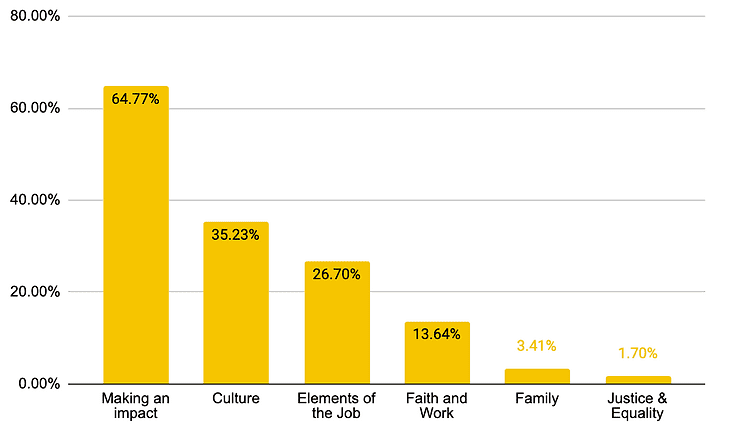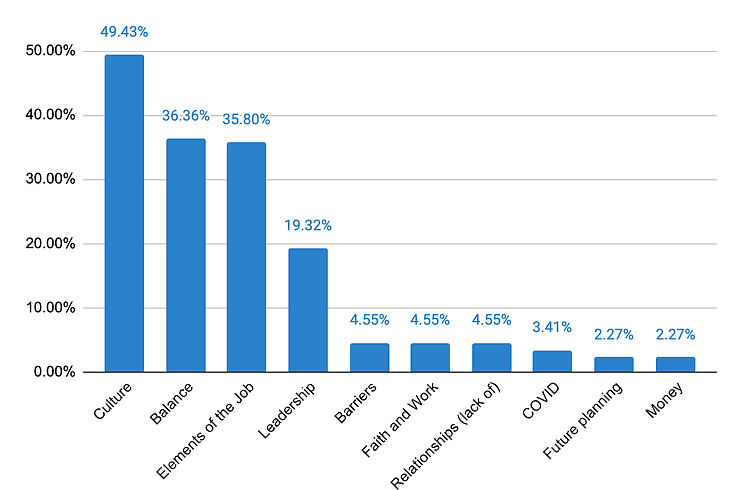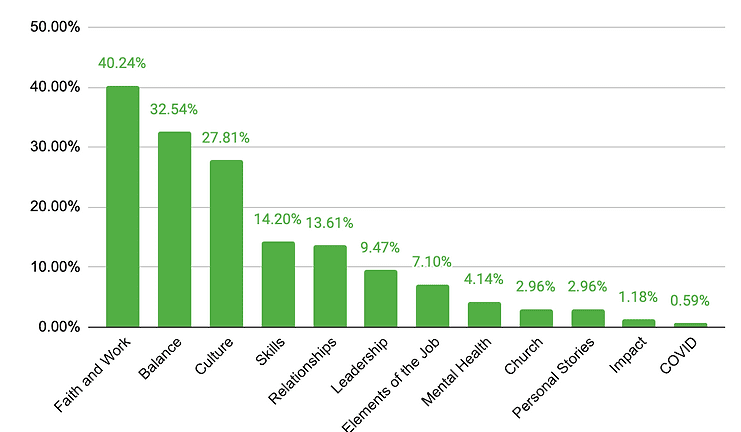Almost 52% of the active workforce are women. During the pandemic, they dropped out of active employment more quickly than men, and now they are returning. At VOCA, we wanted to know what is unique about the lived experience of women at work. What joys and challenges do they face? What kinds of resources might be helpful for them?
So, we asked them. We embarked on a study this past spring, working with partners to distribute a short survey. We crunched the data and gained insight into the world of working women — and came across a few surprises along the way.
In this post, we unpack our findings and share some conclusions about what work is like for women in the post-Covid landscape. We explore the following: 1) Sources of Joy and Meaning; 2) Challenges; 3) Themes of Interest.
Sources of Joy and Meaning
We asked women what brings them joy and meaning at work. Here’s what they said.
The primary way that women in our survey report finding joy and meaning at work is through making an impact — having a noticeable effect on their clients and colleagues.
Secondly, fulfillment at work is also closely related to work culture, particularly the relational connections and sense of belonging.
Coming in third, we have “elements of the job.” Women find the work itself rewarding. Problem solving, learning new skills, and being technically competent are a source of empowerment for women at work.
Faith and work — seeing work as a place to demonstrate God-shaped values and mission and sensing this connection between vocation and spirituality — was the fourth most chosen answer.
What does this tell us? First, many women find work satisfying for a variety of reasons. It is not something that they “have to do.” Their careers are an avenue of meaningful contribution beyond the income they may generate for their households.
However, the experiences of working women also contain pain, weariness, and frustration. Next, we look at the challenges that women report facing at work.
Challenges
Here’s a graph of the results:
What do we see here? First, the top challenge is culture. Cultural challenges for women include the “Boys Club” atmosphere, feeling heard, discriminatory hiring and promotion policies, and feeling undervalued. In our general dilemmas survey sent to both women and men at work, culture came in fourth — but for women specifically, here it is number one. It suggests that many workplaces are not spaces that feel safe and supportive for women, or that recognize women as valuable and respected team members and leaders.
The second most common answer was “Balance.” This is the challenge to fitting it all in: work, family, personal time. Women and men face this issue, but women still seem to carry more household and family responsibilities than their male counterparts. As a result, this “career-care crunch” has an outsized impact on working women and their experience of burnout.
The third most common answer was “Elements of the job.” This category includes the technical issues on the job, the market forces coming to play. Talent shortages and supply chain delays loom large. The demands of customers and the challenges of dealing with certain colleagues wear women down.
Finally, rounding out the challenges that at least 10% of respondents answered with is “Leadership.” Leadership includes the demands of being a leader and the difficulties of dealing with poor leaders. Unnecessary drama, lack of clarity, and lack of resources offered for development are just some of the difficult dynamics of dealing with poor leaders.
Themes of Interest
Finally, we asked women what they wanted to hear more about. In what areas would they like the opportunity to dig deeper?
We were not surprised to see balance and culture near the top. These themes correlate to the challenge results.
We were, however, surprised to see “Faith and Work” as the top answer. There are several possible explanations for this.
-
Women are yearning for spiritual strength to tackle their work challenges.
-
Women are not getting the kind of career-savvy biblical teaching they seek from their churches.
-
Christian women long to see their work as being connected to God’s redemptive work within the world, but struggle to sense God’s presence within their work.
It is also worth noting that trending topics like mental health and COVID-19 received little interest. Work skills, relational acumen, leadership, and job specific insights fill in the middle.
Conclusion
Women love their work but also find it deeply challenging. It would seem they struggle in a kind of in-between—a demanding, passively sexist culture on the one hand and a church culture that often lacks empathy and resources on the other.
Part of the answer they seek may lie in community: community with other women and men, who see them, affirm them, and mentor them to be their best selves. Another urgently-needed solution is to push back against the forces in our workplaces that make work culture a reason for women to struggle, rather than succeed.
Additionally, women seeking to find joy and meaning in their work often find it in the impact they make through their work. How can leaders, organizations, and even churches better articulate the difference that women are making in the world through their labor?
Knowing what we know now, one thing is clear: we must collectively endeavor to better support women in their careers, and continue to learn more about the lived experiences of women and what they want at work.
















